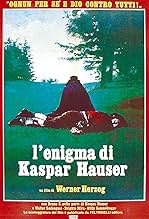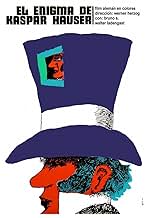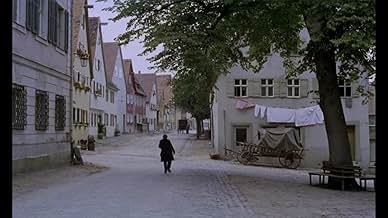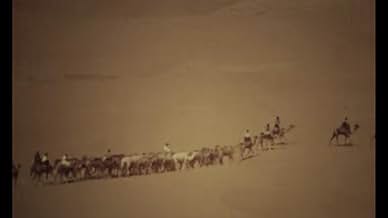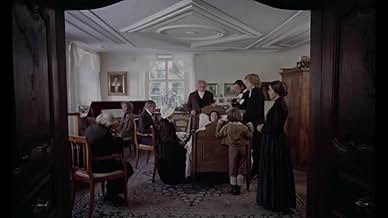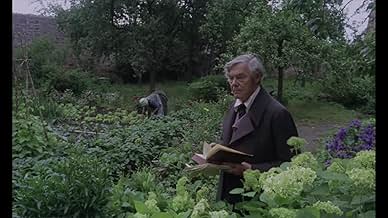IMDb रेटिंग
7.7/10
20 हज़ार
आपकी रेटिंग
अपनी भाषा में प्लॉट जोड़ेंA young man named Kaspar Hauser suddenly appears in Nuremberg in 1828, barely able to talk or walk, and bearing a strange note.A young man named Kaspar Hauser suddenly appears in Nuremberg in 1828, barely able to talk or walk, and bearing a strange note.A young man named Kaspar Hauser suddenly appears in Nuremberg in 1828, barely able to talk or walk, and bearing a strange note.
- पुरस्कार
- 5 जीत और कुल 3 नामांकन
फ़ीचर्ड समीक्षाएं
Herzog has a way with documenting history as if it was our own past we were re-living. It all seems strangely familiar, yet slightly surreal. This film is rich with detail of the period (19th century), yet it's not the slightest bit in-your-face like so many of the current period films that seem to be about nothing more than lush furniture and the people who sit on them. Yet there are images here that you'll never forget! There are some especially stunning sepia dream sequences of an Arabian caravan strolling in soft, slow-motion across a windswept desert. They reminded me of Sam Fuller's effective use of raw colour footage of distant lands in "Shock Corridor". Images that seem to burst out at us from the B&W angst of a mental ward. Such contradictory images seem perfectly normal in Herzog's world, since after all, they're from the world of our dreams.
As always, Herzog finds great music for his score in this film, and he uses it in a very subtle way. But he also is a master at allowing silences to tell part of his story. If one is really listening, they can hear a great many things that define the world that his characters are inhabiting. This of course, was more obvious in films like 'Aguirre', where one swears they can still hear the wild birds squawking in their head for days! Can any film-going experience be more real?
But this film is not all just sound and imagery! The story is a puzzle. It's up to us viewers to decide who this man is and how his mind functions. It also challenges us to think about how our own minds function. While various "instructors" try to cram a lifetime of education into Kaspar's brain in just a few short years, we are forced to re-evaluate the logic that we have been taught. This is illustrated with great tongue-in-cheek humour when Kaspar approaches a lesson in logic with a Zen-like understanding that leaves his instructors livid. Needless to say, this film is a good preamble to "Being There", only more subtle, more haunting, and far more memorable.
The film will also bring to mind "The Elephant Man", not just in its depiction of circus "freaks", but in its illustrations of cruelty, madness, kindness and alienation. It is in essence, a movie about humanity. Told in a poetic vision with just the right doses of wit, intelligence and mystery. For this is, The MYSTERY of Kaspar Hauser. The film never pretends to be a documentation. It is simply an interpretation. One man's imagining of what might have gone inside the mind of a man who was born into the world at sixteen. See it with that in mind, and you'll have one of the richest movie-going experiences in your life!
As always, Herzog finds great music for his score in this film, and he uses it in a very subtle way. But he also is a master at allowing silences to tell part of his story. If one is really listening, they can hear a great many things that define the world that his characters are inhabiting. This of course, was more obvious in films like 'Aguirre', where one swears they can still hear the wild birds squawking in their head for days! Can any film-going experience be more real?
But this film is not all just sound and imagery! The story is a puzzle. It's up to us viewers to decide who this man is and how his mind functions. It also challenges us to think about how our own minds function. While various "instructors" try to cram a lifetime of education into Kaspar's brain in just a few short years, we are forced to re-evaluate the logic that we have been taught. This is illustrated with great tongue-in-cheek humour when Kaspar approaches a lesson in logic with a Zen-like understanding that leaves his instructors livid. Needless to say, this film is a good preamble to "Being There", only more subtle, more haunting, and far more memorable.
The film will also bring to mind "The Elephant Man", not just in its depiction of circus "freaks", but in its illustrations of cruelty, madness, kindness and alienation. It is in essence, a movie about humanity. Told in a poetic vision with just the right doses of wit, intelligence and mystery. For this is, The MYSTERY of Kaspar Hauser. The film never pretends to be a documentation. It is simply an interpretation. One man's imagining of what might have gone inside the mind of a man who was born into the world at sixteen. See it with that in mind, and you'll have one of the richest movie-going experiences in your life!
EVERY MAN FOR HIMSELF AND GOD AGAINST ALL (Werner Herzog - West Germany 1974).
Lacking a traditional narrative or dramatic structure and full of obscure images, this film feels more like a hypnotic dreamlike experience. It also features one the more enduring trends in Herzog's work: the featuring of individuals with exceptional physical or psychological conditions.
The film is based on the true story of Kaspar Hauser, a young man who suddenly appears on the market square in the German town of Nuremberg in 1828. This strange occurrence has become one of the most enduring inspirations in German history, literature and science, with well over a thousand books written on the case. When Kaspar Hauser was found, he could barely grunt, let alone speak and caused a minor sensation among the locals. After living in a cellar for years with only a pet rocking horse, he is abandoned by his protector and provider, the mysterious "Man in Black." Having been isolated from all humans except his mysterious protector, Kaspar is suddenly thrust into civilization, and is expected to adapt himself to 19th-century society. He becomes a public spectacle and everyone in town lines up to catch a glimpse of him. Soon the local officials in town decide he is too much of a (costly) burden and, in an attempt to profit from the public interest, he is turned over to a circus ringmaster, where he is added to the local carnival freak show, as one of "The Four Riddles of the Spheres." The other three include "a midget king", "A little Mozart" (an autistic or catatonic child), and a lute playing "savage". When Hauser comes under the tutelage of a sympathetic professor (Walter Ladengast), he gradually acquires an impressive degree of socialization and learns to express himself with a reasonable degree of clarity, but most of society's conventions, manners and thoughts is more the young man is able to adjust to.
Herzog adopted a technique of incorporating film material shot by others filmmakers into the film. Early on in the film, just before Kaspar is found on the town square, Herzog used material shot on super 8 of a Bavarian landscape and the town of Dinkelsbühl, that was almost disposed off, but Herzog thought it would be ideal for his film. These grainy shots, accompanied by a requiem of Orlando DiLasso, make for one of the most haunting images I've ever seen on film. Dream sequences are another important aspect in this film. In one of them, Kaspar Hauser has dream images of the Sahara desert, for which Herzog used material he shot in the Western Sahara on earlier occasions. I don't know of any other director who used this technique to such avail up until now. One of the most stunning scenes is when the "Man in black" leaves him with the shot on the mountain and soon after the music with the requiem starts. It's almost like a romantic twist on 2001: A Space Odyssey.
Herzog has done a fantastic job recounting the legend of Kaspar Hauser to the screen. The casting of Bruno S. in the role of Kaspar Hauser is of particular interest. He was a street artist in Berlin, when Herzog found him and decided he would be ideal to play the role of Kaspar Hauser. Before this, Bruno S. had a troubled past. After being severely beaten by his mother, he became deaf and was placed in an institution for retarded children at the age of three. At nine, when he tried to escape, he was transferred to a correctional institution. With further escape attempts, he amassed a number of criminal offenses and was incarcerated for more than twenty years. The authenticity of Bruno's performance brings such an element of sincerity to the film, that makes it almost impossible not to root for his cause. Bruno S. also starred in Herzog's STROSZEK (1976).
Camera Obscura --- 10/10
Lacking a traditional narrative or dramatic structure and full of obscure images, this film feels more like a hypnotic dreamlike experience. It also features one the more enduring trends in Herzog's work: the featuring of individuals with exceptional physical or psychological conditions.
The film is based on the true story of Kaspar Hauser, a young man who suddenly appears on the market square in the German town of Nuremberg in 1828. This strange occurrence has become one of the most enduring inspirations in German history, literature and science, with well over a thousand books written on the case. When Kaspar Hauser was found, he could barely grunt, let alone speak and caused a minor sensation among the locals. After living in a cellar for years with only a pet rocking horse, he is abandoned by his protector and provider, the mysterious "Man in Black." Having been isolated from all humans except his mysterious protector, Kaspar is suddenly thrust into civilization, and is expected to adapt himself to 19th-century society. He becomes a public spectacle and everyone in town lines up to catch a glimpse of him. Soon the local officials in town decide he is too much of a (costly) burden and, in an attempt to profit from the public interest, he is turned over to a circus ringmaster, where he is added to the local carnival freak show, as one of "The Four Riddles of the Spheres." The other three include "a midget king", "A little Mozart" (an autistic or catatonic child), and a lute playing "savage". When Hauser comes under the tutelage of a sympathetic professor (Walter Ladengast), he gradually acquires an impressive degree of socialization and learns to express himself with a reasonable degree of clarity, but most of society's conventions, manners and thoughts is more the young man is able to adjust to.
Herzog adopted a technique of incorporating film material shot by others filmmakers into the film. Early on in the film, just before Kaspar is found on the town square, Herzog used material shot on super 8 of a Bavarian landscape and the town of Dinkelsbühl, that was almost disposed off, but Herzog thought it would be ideal for his film. These grainy shots, accompanied by a requiem of Orlando DiLasso, make for one of the most haunting images I've ever seen on film. Dream sequences are another important aspect in this film. In one of them, Kaspar Hauser has dream images of the Sahara desert, for which Herzog used material he shot in the Western Sahara on earlier occasions. I don't know of any other director who used this technique to such avail up until now. One of the most stunning scenes is when the "Man in black" leaves him with the shot on the mountain and soon after the music with the requiem starts. It's almost like a romantic twist on 2001: A Space Odyssey.
Herzog has done a fantastic job recounting the legend of Kaspar Hauser to the screen. The casting of Bruno S. in the role of Kaspar Hauser is of particular interest. He was a street artist in Berlin, when Herzog found him and decided he would be ideal to play the role of Kaspar Hauser. Before this, Bruno S. had a troubled past. After being severely beaten by his mother, he became deaf and was placed in an institution for retarded children at the age of three. At nine, when he tried to escape, he was transferred to a correctional institution. With further escape attempts, he amassed a number of criminal offenses and was incarcerated for more than twenty years. The authenticity of Bruno's performance brings such an element of sincerity to the film, that makes it almost impossible not to root for his cause. Bruno S. also starred in Herzog's STROSZEK (1976).
Camera Obscura --- 10/10
Werner Herzog's films reach emotional and aesthetic levels that few directors can aspire to. As one of the rare film-maker's more concerned with the artistry of their work than what they achieve at the box office, Herzog is nearly peerless in his purity and ideosynchrasy. Herzog uses the film medium as a moving canvas upon which he expresses, affects, and creates nightmares and dreamworlds which are so vividly real that they threaten our own naturalized consciousness of the projection we call reality.
So much for the postmodern gobbledygook. As you can tell, I love Herzog.
This early film deals with many of the familiar elements that tend to permeate Herzog's films - cultural critique, the insanity of everyday life, alienation, cruelty and power. But here, Herzog uses a true story of 19th century Europe as a vehicle, and treats his subject with an unusual compassion and straightforwardness.
Herzog's incredible casting talent also shows here, just as it does in all of his films. I do not wish to take anything away from the great performers, but really, how does one manage to choose an actor whose life experience is broadly similar to that of Kaspar Hauser's without knowing of it beforehand? This film blends somewhat disjointed artistic imagery with the true story of Kaspar Hauser, a man apart from society who has been kept in a cellar all of his life, and is suddenly expelled into the light in Nuremburg. He is adopted by a kindly old gent who attempts to socialize him in what appears to Kaspar (and perhaps to us through the film's clear vision) an insane society full of lies and contradictions. All of this is done with the believability that is so consistent in Herzog's theatricality, and the visual quality that qualifies him as a true cinematographic artist.
So much for the postmodern gobbledygook. As you can tell, I love Herzog.
This early film deals with many of the familiar elements that tend to permeate Herzog's films - cultural critique, the insanity of everyday life, alienation, cruelty and power. But here, Herzog uses a true story of 19th century Europe as a vehicle, and treats his subject with an unusual compassion and straightforwardness.
Herzog's incredible casting talent also shows here, just as it does in all of his films. I do not wish to take anything away from the great performers, but really, how does one manage to choose an actor whose life experience is broadly similar to that of Kaspar Hauser's without knowing of it beforehand? This film blends somewhat disjointed artistic imagery with the true story of Kaspar Hauser, a man apart from society who has been kept in a cellar all of his life, and is suddenly expelled into the light in Nuremburg. He is adopted by a kindly old gent who attempts to socialize him in what appears to Kaspar (and perhaps to us through the film's clear vision) an insane society full of lies and contradictions. All of this is done with the believability that is so consistent in Herzog's theatricality, and the visual quality that qualifies him as a true cinematographic artist.
Even if this film had failed on the level of character or narrative (which it doesn't), I would still love this movie for its incredible imagery. The memory/dream sequences are haunting and will never leave my head. The opening shot of a field, long blades grass bowing under the wind to the music of Pachelbel, is extraordinary. And of course there's the performance of Bruno S, the most intensely hypnotic and genuine performance you will ever see.
But my favorite scene is of the impresario and the dwarf king and his kingdom. This is a true Herzog moment -- bizarre but somehow still a moment of striking epiphany -- the dwarf a parallel, isolated soul to Kasper's own isolated, lonely soul. The extremity and weirdness of moments like these seem commonplace and everyday in a Herzog film, and therefore somehow commonplace and everyday even in our own lives.
But my favorite scene is of the impresario and the dwarf king and his kingdom. This is a true Herzog moment -- bizarre but somehow still a moment of striking epiphany -- the dwarf a parallel, isolated soul to Kasper's own isolated, lonely soul. The extremity and weirdness of moments like these seem commonplace and everyday in a Herzog film, and therefore somehow commonplace and everyday even in our own lives.
It's a well known philosophical conundrum, would a man be able to think (or even be properly considered a man) if he was denied all sensory stimulation? In Nuremburg in 1828, there was a practical test of this proposition, when a person was discovered in town who had spent all his previous life incarcerated and denied human contact. He was duly taught how to think; but in fact, was not grateful for the experience. Werner Herzog's film examines the strange life of Kaspar Hauser - I find it hard to say whether or not I consider it a good film, because that life itself was so strange. Certainly it better recreated the bafflement of those who interacted with Kaspar than it managed to suggest what it really felt like to be Kaspar - but then, who could know? It's probably not Herzog's greatest achievement - but it's certainly an intriguing subject.
क्या आपको पता है
- ट्रिवियाTo perform the scene in which Kaspar learns to walk, actor Bruno S. knelt for three hours with a stick behind his knees until his legs were too numb to stand.
- गूफ़In a brief scene we see a stork eating a frog with its legs tagged (ringed), but bird ringing didn't start until the end of the nineteenth century, decades after the life of Kaspar Hauser.
- भाव
Opening caption: Do you not then hear this horrible scream all around you that people usually call silence.
- क्रेज़ी क्रेडिटOpening credits prologue: One Sunday in 1828 a ragged boy was found abandoned in the town of N. He could hardly walk and spoke but one sentence.
Later, he told of being locked in a dark cellar from birth. He had never seen another human being, a tree, a house before.
To this day no one knows where he came from - or who set him free.
Don't you hear that horrible screaming all around you? That screaming men call silence?
- कनेक्शनFeatured in Was ich bin, sind meine Filme (1978)
- साउंडट्रैकCanon in D major
Composed by Johann Pachelbel
टॉप पसंद
रेटिंग देने के लिए साइन-इन करें और वैयक्तिकृत सुझावों के लिए वॉचलिस्ट करें
- How long is The Enigma of Kaspar Hauser?Alexa द्वारा संचालित
विवरण
- रिलीज़ की तारीख़
- कंट्री ऑफ़ ओरिजिन
- भाषा
- इस रूप में भी जाना जाता है
- The Enigma of Kaspar Hauser
- फ़िल्माने की जगहें
- Croagh Patrick, Westport, Mayo, आयरलैंड(archive footage)
- उत्पादन कंपनियां
- IMDbPro पर और कंपनी क्रेडिट देखें
बॉक्स ऑफ़िस
- दुनिया भर में सकल
- $3,451
- चलने की अवधि1 घंटा 50 मिनट
- ध्वनि मिश्रण
- पक्ष अनुपात
- 1.66 : 1
इस पेज में योगदान दें
किसी बदलाव का सुझाव दें या अनुपलब्ध कॉन्टेंट जोड़ें

टॉप गैप
By what name was Jeder für sich und Gott gegen alle (1974) officially released in India in English?
जवाब

